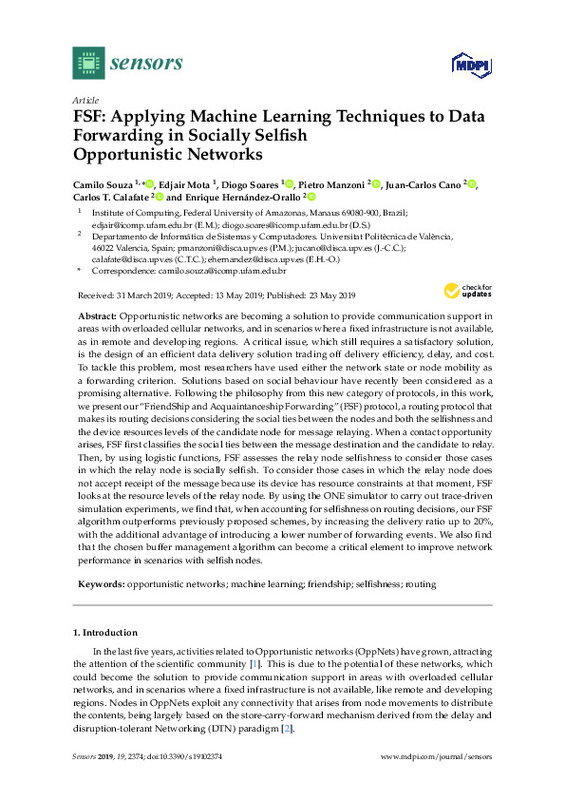Trifunovic, S., Kouyoumdjieva, S. T., Distl, B., Pajevic, L., Karlsson, G., & Plattner, B. (2017). A Decade of Research in Opportunistic Networks: Challenges, Relevance, and Future Directions. IEEE Communications Magazine, 55(1), 168-173. doi:10.1109/mcom.2017.1500527cm
Lu, X., Lio, P., & Hui, P. (2016). Distance-Based Opportunistic Mobile Data Offloading. Sensors, 16(6), 878. doi:10.3390/s16060878
Zeng, F., Zhao, N., & Li, W. (2017). Effective Social Relationship Measurement and Cluster Based Routing in Mobile Opportunistic Networks. Sensors, 17(5), 1109. doi:10.3390/s17051109
[+]
Trifunovic, S., Kouyoumdjieva, S. T., Distl, B., Pajevic, L., Karlsson, G., & Plattner, B. (2017). A Decade of Research in Opportunistic Networks: Challenges, Relevance, and Future Directions. IEEE Communications Magazine, 55(1), 168-173. doi:10.1109/mcom.2017.1500527cm
Lu, X., Lio, P., & Hui, P. (2016). Distance-Based Opportunistic Mobile Data Offloading. Sensors, 16(6), 878. doi:10.3390/s16060878
Zeng, F., Zhao, N., & Li, W. (2017). Effective Social Relationship Measurement and Cluster Based Routing in Mobile Opportunistic Networks. Sensors, 17(5), 1109. doi:10.3390/s17051109
Khabbaz, M. J., Assi, C. M., & Fawaz, W. F. (2012). Disruption-Tolerant Networking: A Comprehensive Survey on Recent Developments and Persisting Challenges. IEEE Communications Surveys & Tutorials, 14(2), 607-640. doi:10.1109/surv.2011.041911.00093
Miao, J., Hasan, O., Mokhtar, S. B., Brunie, L., & Yim, K. (2013). An investigation on the unwillingness of nodes to participate in mobile delay tolerant network routing. International Journal of Information Management, 33(2), 252-262. doi:10.1016/j.ijinfomgt.2012.11.001
CRAWDAD Dataset Uoi/Haggle (v. 2016-08-28): Derived from Cambridge/Haggle (v. 2009-05-29)https://crawdad.org/uoi/haggle/20160828
Eagle, N., Pentland, A., & Lazer, D. (2009). Inferring friendship network structure by using mobile phone data. Proceedings of the National Academy of Sciences, 106(36), 15274-15278. doi:10.1073/pnas.0900282106
Tsai, T.-C., & Chan, H.-H. (2015). NCCU Trace: social-network-aware mobility trace. IEEE Communications Magazine, 53(10), 144-149. doi:10.1109/mcom.2015.7295476
Hui, P., Crowcroft, J., & Yoneki, E. (2011). BUBBLE Rap: Social-Based Forwarding in Delay-Tolerant Networks. IEEE Transactions on Mobile Computing, 10(11), 1576-1589. doi:10.1109/tmc.2010.246
Lindgren, A., Doria, A., & Schelén, O. (2003). Probabilistic routing in intermittently connected networks. ACM SIGMOBILE Mobile Computing and Communications Review, 7(3), 19-20. doi:10.1145/961268.961272
Cao, Y., & Sun, Z. (2013). Routing in Delay/Disruption Tolerant Networks: A Taxonomy, Survey and Challenges. IEEE Communications Surveys & Tutorials, 15(2), 654-677. doi:10.1109/surv.2012.042512.00053
Zhu, Y., Xu, B., Shi, X., & Wang, Y. (2013). A Survey of Social-Based Routing in Delay Tolerant Networks: Positive and Negative Social Effects. IEEE Communications Surveys & Tutorials, 15(1), 387-401. doi:10.1109/surv.2012.032612.00004
Shah, R. C., Roy, S., Jain, S., & Brunette, W. (2003). Data MULEs: modeling and analysis of a three-tier architecture for sparse sensor networks. Ad Hoc Networks, 1(2-3), 215-233. doi:10.1016/s1570-8705(03)00003-9
Burns, B., Brock, O., & Levine, B. N. (2008). MORA routing and capacity building in disruption-tolerant networks. Ad Hoc Networks, 6(4), 600-620. doi:10.1016/j.adhoc.2007.05.002
Shaghaghian, S., & Coates, M. (2015). Optimal Forwarding in Opportunistic Delay Tolerant Networks With Meeting Rate Estimations. IEEE Transactions on Signal and Information Processing over Networks, 1(2), 104-116. doi:10.1109/tsipn.2015.2452811
Li, L., Qin, Y., & Zhong, X. (2016). A Novel Routing Scheme for Resource-Constraint Opportunistic Networks: A Cooperative Multiplayer Bargaining Game Approach. IEEE Transactions on Vehicular Technology, 65(8), 6547-6561. doi:10.1109/tvt.2015.2476703
Juang, P., Oki, H., Wang, Y., Martonosi, M., Peh, L. S., & Rubenstein, D. (2002). Energy-efficient computing for wildlife tracking. ACM SIGPLAN Notices, 37(10), 96-107. doi:10.1145/605432.605408
Spyropoulos, T., Psounis, K., & Raghavendra, C. S. (2008). Efficient Routing in Intermittently Connected Mobile Networks: The Single-Copy Case. IEEE/ACM Transactions on Networking, 16(1), 63-76. doi:10.1109/tnet.2007.897962
Zhang, L., Wang, X., Lu, J., Ren, M., Duan, Z., & Cai, Z. (2014). A novel contact prediction-based routing scheme for DTNs. Transactions on Emerging Telecommunications Technologies, 28(1), e2889. doi:10.1002/ett.2889
Okasha, S. (2005). Altruism, Group Selection and Correlated Interaction. The British Journal for the Philosophy of Science, 56(4), 703-725. doi:10.1093/bjps/axi143
Hernandez-Orallo, E., Olmos, M. D. S., Cano, J.-C., Calafate, C. T., & Manzoni, P. (2015). CoCoWa: A Collaborative Contact-Based Watchdog for Detecting Selfish Nodes. IEEE Transactions on Mobile Computing, 14(6), 1162-1175. doi:10.1109/tmc.2014.2343627
[-]









